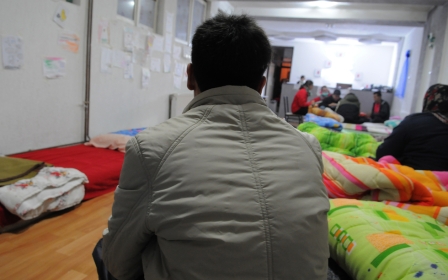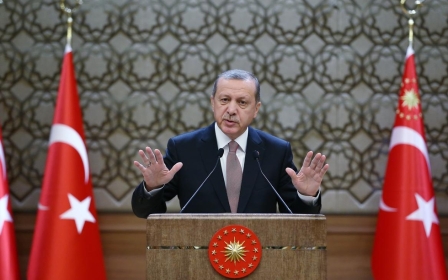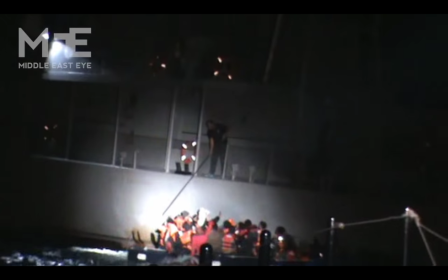The EU-Turkey summit: A possible turning point - with major pitfalls

In an attempt to overcome Europe’s biggest refugee crisis since World War II, European Union heads of state and Turkish Prime Minister Ahmet Davutoglu met in an unusual summit on 29 November.
As Davutoğlu made it clear, the event was “historic”, not only because for the first time in 11 years all 28 EU leaders attended a high-level meeting with the Turkish government. The summit was furthermore marked with strong mutual commitments by the two sides, with a potential to open a new era both for the refugees and Euro-Turkish relations.
However, there is an undeniable reason to question the summit’s success. Turkey’s 50 years of EU accession process has been extremely prolonged due to the fact that Turkish and European political elites are traditionally unable to keep their commitments. Here and now, the lives of millions of refugees depend on to what extent they will change their habits of disengagement.
Refugee crisis was the main drive for the summit
During 2015, 600,000 thousand refugees have reportedly entered the EU through Turkey, most of them are Syrian citizens fleeing the ongoing civil war in their country since 2011. Moreover, the EU side is alarmed with the likelihood of one million more refugees in 2016, should the war continue.
Against this background, at the Valetta meeting on migration on 12 November, the EU leaders decided to hold a summit with Turkey to discuss a deal to curb the flow of migration. If accepted, the deal would see Turkey receive three billion euros.
The AKP government perceived the EU’s intentions as an opportunity, not merely for the promised funds, but maybe more importantly for refreshing the eroded relations. Since 2005, Turkey has been engaged in negotiations with the EU for harmonisation of regulations in a wide range of areas (acquis communautaire) divided under 33 chapters.
However, only 14 of these have been opened for negotiation. Other than such technical deadlocks, the general political dialogue has been feeble due to incompatible visions. This has been even more obvious regarding the refugee crisis, as Turkey continually accused the EU of not sharing the responsibility for handling the problem.
For the Davutoglu cabinet, a new window of dialogue with the EU signified new foreign policy alternatives. Being troubled with many regional problems and losing important allies, the Turkish government wanted to promote itself as a pro-European authority. This understanding was clearly expressed in Davutoglu’s statement before the summit: “We are a European nation, and Turkey is doing everything possible for the future of our continent."
For Ankara, controlling the migration flow was not seen as a single objective, but as the beginning of a chain of concessions. However, it is obvious that the EU side was more single-minded and put a big burden on Turkey before giving anything in return.
The AKP government is now expected to tighten its border security, fight more effectively against illegal migration and human trafficking, readmit thousands of refugees who entered the EU through Turkish territory and more particularly ameliorate the situation of over two million Syrians currently dispersed all over the country.
The Syrian refugees in Turkey are not given asylum but only have “conditional refugee” status without being granted permanent residence or work permits. According to its new commitments, the AKP government now needs to integrate them in the job market and improve their living standards, only to ensure that they do not feel the urge to flee onward to Europe. The EU also expects six more refugee camps to be built in Turkey in addition to the 25 camps where 260,000 Syrians currently stay.
In exchange, Turkey will gradually receive the promised financial aid as it takes concrete steps. In concrete terms, the EU also envisages to lift visa requirement for Turkish citizens by October 2016 and open a new chapter in the accession negotiations.
Can there be a radical change in Euro-Turkish relations?
With clear goals and strategy, the EU and Turkey seem to be engaged in a new sort of relationship on equal terms. However, such an engagement is taken on fragile grounds and two sides are in fact expected to radically change their postures.
Although the Turkish AKP government has been generous to the Syrian refugees, it is well aware that its deal with the EU means an irrevocable step to ensure their permanent stay in Turkey.
In a country already marked with serious social and economic challenges such as unemployment (10 percent according to official numbers), poverty (16 percent of the population lives under poverty line) and increased polarisation, attempts to integrate millions of Syrians may well imply a risk of jeopardising the public support AKP traditionally receives.
In his regard, after already spending eight million euros on the refugees, the government would not content itself with the promised three billion euros but aspire for other valuable gains that it can later sell on the electoral market.
In this regard, a visa-free EU would be the most immediately marketable gain in domestic politics. In the longer term, re-accelerated accession process or deeper relations with the EU would also have some positive effects on the economy and foreign policy.
With such calculations, the AKP government can be expected to take certain measures in line with its commitments, but their intensity will depend on the signals sent out by the EU leaders regarding their own commitments.
For over a decade, Turkey has been the only EU candidate country whose citizens required a visa to travel to member states. The reasons for this can be various, but the official explanation was that Turkey did not respect the readmission agreement of 2013 and rejected the return of migrants who had entered the EU though its territories.
Nevertheless, even if Turkey respects its commitments, the visa exemption is definitely not to be taken for granted. Considering the rise of extreme right parties and xenophobic feelings in many European countries, it would still be daring of the EU leaders to grant visa exemption to Turkey’s 75 million population in less than a year, especially against the backdrop of elections in France and Germany.
The dilemmas of the EU side are not limited to the visa question. Although promising three billion euros, the sources for such an economic burden are still unknown. Only 500 million euros will be coming from the EU’s common funds, the remaining part being planned to be provided by member states’ national budgets. Conversely, many members have already declared their reluctance to contribute.
For the first time, the EU and Turkey are making big commitments to be realised in such a short period. Considering the problematic nature of EU-Turkey relations, one cannot comfortably suggest that the two sides will be able to take all necessary steps as promptly as they have said they will.
However, this time they are also responsible towards millions of refugees. The deal, by largely excluding the refugees’ point of view, may seem unpromising. It is, on the other hand, the largest international initiative in which 29 heads of state have achieved a certain consensus to offer a hand to the refugees.
The odds that the Turkish and EU sides will perfectly respect their mutual commitments are not high, but in case they do, their deal may at least bring a certain order to the very chaotic management of the refugee crisis. This would not be an achievement in itself, but may constitute a substantial first step toward more effective and broader international cooperation.
- Ozan Serdaroglu has research experience on Turkey and the Eastern Mediterranean, with a focus on political and economic development, Euro-Med relations, conflict management, regional cooperation and energy issues.
The views expressed in this article belong to the author and do not necessarily reflect the editorial policy of Middle East Eye.
Photo: A man hugs his daughter and son as migrants and refugees arrive on the Greek island of Lesbos after crossing the Aegean Sea from Turkey on 20 November, 2015 (AFP).
New MEE newsletter: Jerusalem Dispatch
Sign up to get the latest insights and analysis on Israel-Palestine, alongside Turkey Unpacked and other MEE newsletters
Middle East Eye delivers independent and unrivalled coverage and analysis of the Middle East, North Africa and beyond. To learn more about republishing this content and the associated fees, please fill out this form. More about MEE can be found here.





